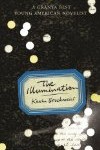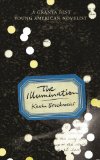Five words from the blurb: pain, manifesting, light, human, phenomenon
The Illumination has a fantastically original premise: What would happen if we could see pain? Would our interactions with other people change if we could see exactly how painful our colleague’s toothache was, spot tumors inside strangers on the street, or see the continual suffering of the elderly?
The book is set in the present day, but the world has been changed by the arrival of a new phenomenon in which all pain and suffering, both physical and emotional, manifests itself as light.
A moment later, when she saw the light shining out of her incision, she thought she was hallucinating. It was steady and uniform, a silvery-white disk that showed even through her thumbnail, as bright and finely edged as the light in a Hopper painting. Through the haze of drugs, it seemed to her that the light was not falling over her wound or even infusing it from the inside but radiating through it from another world.
This simple change alters many aspects of life and I found myself thinking about the way our society tends to hide its suffering, particularly the emotional kind. It made me wish that we could see the pain of others, and be able to offer support and help to those who need it.
My only problem with this book was that it didn’t contain a compelling plot. It was more like a series of short stories, moving from one character the next in a random, unpredictable fashion. It was impossible to know whether the character you’d just been introduced to would appear again, or would go on to play a more dominant role in the next chapter. Questions were left unanswered and wonderful plot snippets were left dangling without any conclusion. This fractured style frustrated me on one level, but on another it allowed me to think clearly about attitudes to pain without being distracted by character and plot.
The writing quality was excellent and I’m sure I’ll remember scenes from this book for a long time to come. It is a wonderfully unique novel. Recommended.

.
The thoughts of other bloggers:
… a beautifully rendered and deeply touching meditation on pain. The Book Lady’s Blog
…it was uneven and there were times when I just wanted to put the book down and walk away. Amy’s Book Obsession
It is one of those novels with a simple concept like Saramago’s Blindness where a universal change to human experience suddenly appears and alters perception. Just William’s Luck


22 replies on “The Illumination – Kevin Brockmeier”
What an interesting idea! It would indeed be very helpful if we could see pain, I think we’d see a shift in society overall to one that is far more caring because we’d be able to recognise similarities between ourselves and others. Even with evidence, it can be hard sometimes to believe that you’re not the only one in a situation.
I think I can understand from what you’ve said why the short story aspect would be annoying, but suppose that because of the theme and what it could mean, discussing it in such a way with many stories would make for a bigger view – the kind of thing you’re saying about not being distracted.
Sounds fascinating!
Charlie, I find that people often shrug off their pain and so will deny it, even if it looks as though they are suffering. It would be really useful to know if someone really is just tired or is hiding something worse. Such a thought-provokign book!
It is an intriguing thought, but I’m not sure if it would be such a good thing to see everyone’s pain. While we could better know who needed extra TLC, it would also be despiriting because I think everyone carries some pain around. Also, not everyone wants to suffer publicly. But it is great food for thought.
Sandy, There are pros and cons, but it does make an interesting discussion. I think people might find it reassuring to know how many others carried around a little bit of pain and it would be really nice to have a visual indicator so you can tell who is just whinging and who is underplaying it. I really need to find someone to have a longer discussion about this!
A great concept, although I do like a strong plot to get me through a book. I might look out for it in future when I don’t have loads to read already!
Ellie, I normally require a strong plot so the fact I enjoyed this book despite it not having any forward momentum shows how powerful the text was. Perhaps you can pick this up in your library at a later date?
I recently read Brockmeier’s earlier novel, A Brief History of the Dead, and really enjoyed it. It kind of reminded me of a blend of Blindness and The Road, though I can’t really pinpoint why that is. It definitely had that short story vibe that you mention here, though it was a little more cohesive, I think. Still, you may want to check it out! I will be writing a review about it eventually, but right now I’m woefully behind in my reviews!
Steph, Anything that is compared to Blindness and The Road goes straight on my list! If only they didn’t have the short story problem they could well become favourites. Even with this issue I still enjoyed this one and it sounds as though I’ll like A Brief History of the Dead too – I’ll keep an eye out for your review. 🙂
I read Brockmeier’s other work A Brief History of the Dead about a month ago. I really liked his writing style. He’s quite good at taking an idea that is a little ‘out there’ and really making me believe in the world he’s creating. Like you, I didn’t like were the dangling plot lines, but probably more because I wanted to know more!
Jenna, I was impressed by the realistic feel of such a new concept too. I love authors that are able to create these new worlds and I will ensure I read A Brief History of the Dead, despite knowing that I’ll be left craving to know more about the characters.
I’ve been pretty hesitant about reading this one. I think it has to do with the fact that the synopsis felt really strange to me. But, I’m glad you recommend it because I want to jump into some untested waters and see how the reading goes.
Aths, I think the premise sounds fantastic so it would be interesting to know what a sceptic thinks of it. I hope that you enjoy it if you decide to give it a try.
I’ve heard really great things about this one. It’s been on my TBR for a bit. I think I’ll move it up.
Brenna, It didn’t stay on my TBR pile for very long as I kept seeing wonderful things about it. I’m sure it will end up at the top of your pile very soon too 🙂 I hope you enjoy it!
Sounds like the premise is stronger than the plot, but the idea is very interesting. It would make it easy to tell if a child was faking being sick to get out of school if nothing else … or if a wife was faking a headache!!!
Jenners, LOL! I love the idea of removing headache faking!! I’m sure a lot of people would have very different lives if they didn’t fake symptoms like that 😉
Like Just William’s Luck, I was going to relate it somewhat to Blindness. This really does seem very interesting. Definitely going to added to my TBR.
She, It was William’s mention of Saramago that got me really excited about this book. They aren’t that similar, but I think that fans of Saramago will find a lot to like in this book. I hope that you enjoy it too. 🙂
Seeing pain would be almost like not being able to lie – it could be the make or break of a society. That book sounds like good food for thought, if nothing else.
Alex, It is interesting that you should mention lying. One of the symptoms of Asperger’s is that they find it difficult to lie convincingly, to the extent that you can almost say they live in a world without lying. I did find it hard to adjust to inititally, but after a while I wished that noone lied. It would make everything so much easier – someone should write a book about it!
I’d never heard of this one, so thanks for bringing it to my attention. I love books that do something completely different. That said, a plot normally helps 🙂
Andrew, I normally hate any book without a plot, so the fact I enjoyed this one says a lot. I think you’d like it too. 🙂